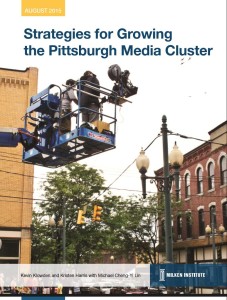![]()
 The Milken Institute released a report last week on “Strategies for Growing Pittsburgh’s Media Cluster” that calls for a coordinated strategy to develop an entertainment and technology cluster in Pittsburgh with the talent and media infrastructure to compete with cities such as Atlanta, New Orleans, Toronto and even New York.
The Milken Institute released a report last week on “Strategies for Growing Pittsburgh’s Media Cluster” that calls for a coordinated strategy to develop an entertainment and technology cluster in Pittsburgh with the talent and media infrastructure to compete with cities such as Atlanta, New Orleans, Toronto and even New York.
Over the years, Pittsburgh has been the setting for popular movies and television shows including Silence of the Lambs, Batman and Mr. Rogers’ Neighborhood. The metro area has seen a total film industry economic impact of $1 billion since the formation in 1990 of the Pittsburgh Film Office, which markets the southwestern Pennsylvania region to film and TV producers. But according to the report, competition within the U.S. and from overseas challenges the city’s ability to attract movie and TV productions as producers look for the right combination of local talent, infrastructure in the form of facilities and service providers, and financial incentives, when determining where to locate a project.
“Today, a metropolitan area must offer producers more than just low costs. A deep pool of skilled local talent, state-of-the-art soundstages and related facilities, and support services all are part of the package that filmmakers expect and require,” said Kevin Klowden, managing economist at the Milken Institute and coauthor of the report. “The experts we interviewed made it clear that sustained investment in retaining human capital and building infrastructure requires a stable commitment to film production incentives.”
Currently, Pennsylvania’s film production incentives are renewed annually, while many productions are budgeted on a five-year basis. The amount of money available through the incentive program is not consistent from year to year. These factors severely limit Pittsburgh’s ability to attract multi-year productions such as television shows.
“With the success of the state’s film tax credit program, the amount of projects, new money, and jobs that come to the region each year has increased,” said Dawn Keezer, director of the Pittsburgh Film office. “The issue that we face now is that without Pennsylvania’s making a long-term commitment to the program of at least five years, there is too much uncertainty for long-term projects and new businesses to open in our region.”
The benefits of a strong media cluster can be directly found in how film productions impact the local economy. Using methodology from the U.S. Bureau of Economic Analysis, the Institute estimated that 107 new jobs are created for each $10 million spent on productions in the Pittsburgh area. “For the entertainment industry in Pittsburgh, every dollar that is spent produces $1.27 for the overall economy,” said Klowden.
In its assessment the Milken Institute engaged producers, business owners and other decision makers, both in Pittsburgh and in Hollywood to determine not only what Pittsburgh’s key comparative advantages are, but also what steps it must take to become home to a thriving cluster of media and related jobs. A cluster is essential, because it creates a critical mass of employers and skilled workers that provides both job and economic security. The report calls for the Pittsburgh Film Office to lead the creation of a stakeholder group to develop and advocate for a strategy to accomplish three main objectives:
- Create and retain a skilled entertainment workforce
Unlike other cities, Pittsburgh does not need to develop new training programs for aspiring filmmakers, but instead must create a coordinated strategy to retain the graduates already produced locally. To attract and retain more skilled workers, a strong investment in the local infrastructure is needed to ensure that the workforce remains fully employed.
- Invest in entertainment infrastructure
For Pittsburgh to consistently lure movie and television projects, it must have sufficient capacity to house and support a number of productions year-round, and not just when the weather is good. This means multiple soundstages and vendors to provide services throughout the productions. Although Pittsburgh has the core of this capacity, it pales in comparison to rivals. Purpose-built facilities would not only be vital in securing a steady flow of productions, but would also allow longstanding firms and new startups to cluster together and provide a broader economic impact for the entire area.
- Ensure political support and long-term commitment to film incentives
Sustained investment in retaining human capital and building infrastructure requires a stable commitment to film production incentives. This issue requires a concerted effort on the part of businesses, educational institutions and organizations, led by the Pittsburgh Film Office, to influence policy and restructure the incentives program so that production companies can anticipate costs in a reliable way.
“The goal of our report is to help the Pittsburgh Film Office, along with local universities and businesses, create a thriving entertainment media cluster,” said Klowden. “If Pittsburgh can present a strong clear vision for its media cluster over the next several years, it has a tremendous opportunity to thrive and grow to be truly world class.”
“Strategies for Growing Pittsburgh’s Media Cluster,” by Kevin Klowden, Kristen Harris and Michael Lin is available at http://www.milkeninstitute.org/publications/view/730.





